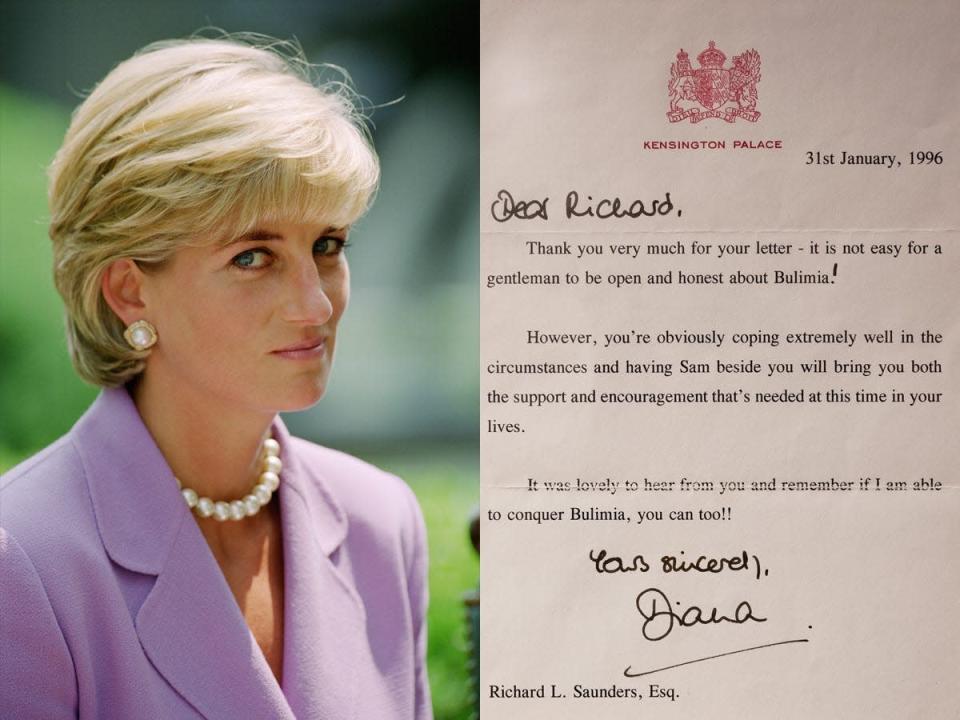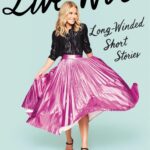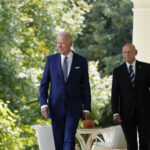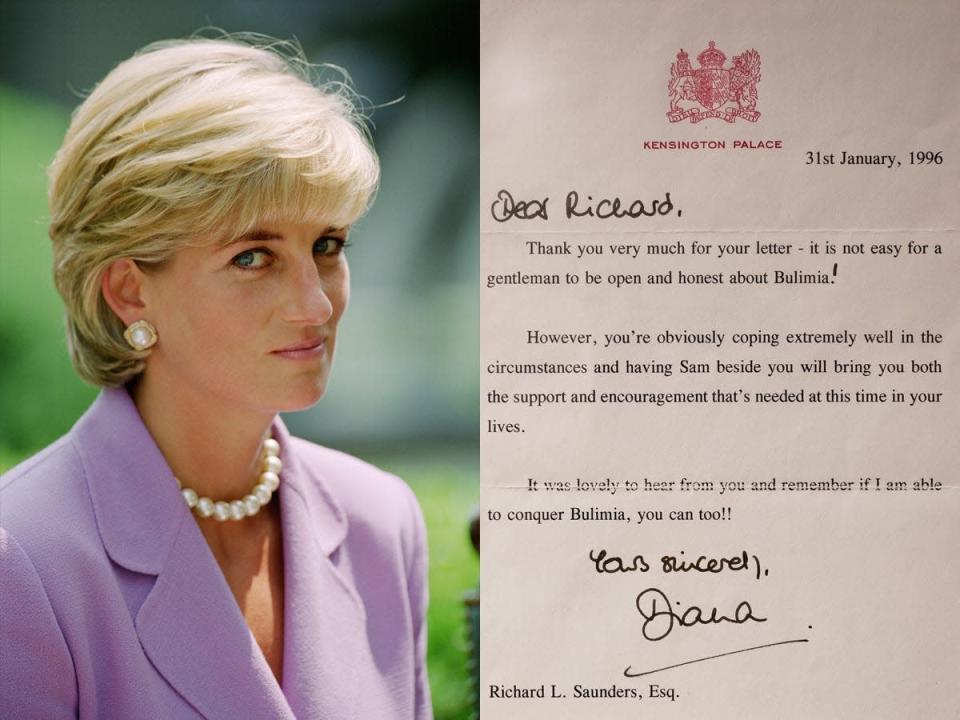
-
“Princess Diana: A Tribute Exhibition” opened in Las Vegas earlier this month.
-
It features more than 700 artifacts from the life of the royal who died 25 years ago.
-
The collection includes a handwritten invitation to Prince Harry’s 4th birthday party.
The new exhibition has over 700 items from Princess Diana
A new exhibition opened this month in Las Vegas to coincide with the 25th anniversary of the death of Diana.
The attraction, “Princess Diana: A Tribute Exhibition,” occupies a 10,000-square-foot space where more than 700 items of memorabilia are on display. They include some of the late royal’s evening gowns and artifacts such as the personal letters she wrote and the presents she gave to friends.
David Corelli, the curator of the exhibition, told Insider many of the items had not been seen before by the general public. He said he selected each of them with care to celebrate the “life and legacy” of Diana.
“Diana’s message continues to get stronger and stronger with the passage of time,” Corelli said. He added, “She is one of the most influential people of our time.”
“She single-handedly changed the world with her humanitarian efforts, the love she showed for her family and others, and the impact she made on fashion.”
He said the exhibit — which starts with a show of relics from her childhood in the UK — featured artifacts from her wedding to Prince Charles in 1981. Many of the dresses on display were sold at auction in 1996 at Sotheby’s New York. The proceeds were split between some of Diana’s favorite charities.
Tickets for the exhibition — which is inside The Shops at Crystals — start at $30 for adults. The price of admission includes a donation to the breast-cancer charity Pink Ribbons Crusade.
This off-the-shoulder ball gown is typical of the fairytale-esque dresses that Diana wore in the ’80s, when she joined the British royal family.
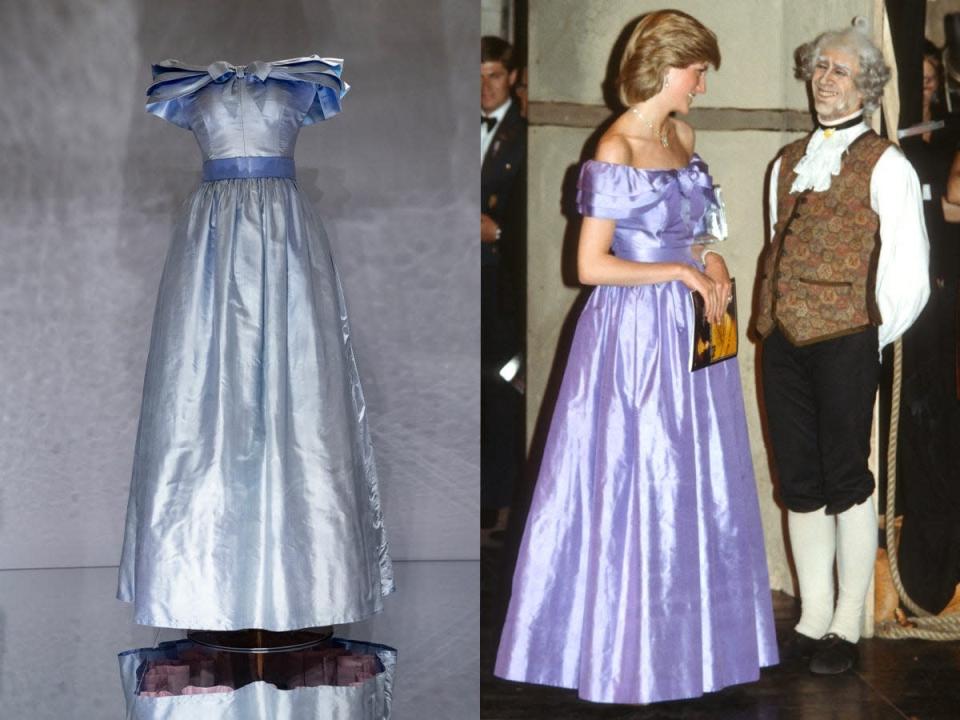

Corelli told Insider this Donald Campbell number was representative of the gowns she wore near the start of her marriage to Charles.
“It’s one of her early ball gowns,” Corelli said of the dress that was designed by Campbell. Many of her outfits in the early ’80s were created by him and his team.
Corelli said she first wore it during her royal tour of New Zealand with her husband in 1983 when she went backstage and met the performers of the ballet “Coppélia.”
“We included this gown in the exhibition because it demonstrates how she was a bit unsure about fashion at first,” Corelli said.
He said the royals didn’t “quite know how to dress her,” adding: “They defaulted to these Cinderella-style gowns — like a princess in a fairytale.”
The curator said they contrasted sharply with the sleek and sexy numbers that she wore after she got into her stride in terms of fashion.
“She wore designers like Versace towards the end of her life,” Corelli said. He added, “She took control and refined her look.”
Diana wrote many of the party invitations she sent by hand, including this one for Prince Harry’s 4th birthday celebration.


People might think that busy royals such as Diana might delegate time-consuming responsibilities like writing birthday-party invitations, Corelli said.
But according to the curator, the mom of two often eschewed formal stationery with her coat of arms on the letterhead, in favor of stationery she bought on the high street.
“She’d buy the kind of inexpensive, kid-themed invitations that most people get from stores,” Corelli said. He added, “She’d write them by hand, which gave them a personal touch.”
The exhibition includes a colorful invitation that Diana dispatched for Prince Harry’s 4th birthday party in 1988 at Kensington Palace. She filled in all the blanks on the card, which featured balloons and a dog wearing a crown.
It was addressed to Doreen Myers, who had become a confidant of the princess. Corelli said Diana met Myers in the hallway of a hospital.
“It was during a private visit, not a formal engagement,” Corelli said.
He said the royal “struck up a friendship” with Myers.
“She had a kind of pen-pal relationship with a lot of people she randomly met,” Corelli said. “It’s testimony to her compassion that she reached out to people that she felt needed extra love and support.”
Neighbors gave Charles, now King Charles III, and Diana this garden bench as a wedding present in 1981.


Corelli said a group of neighbors presented Charles and Diana with a wrought-iron bench as a wedding present.
He said the neighbors lived near the then newlyweds’ country residence, Highgrove House, in the English county of Gloucestershire.
“It was customized, and you can see the initials C and D intertwined with hearts on the back of the bench,” Corelli said.
The bench sat in the gardens of Highgrove for 11 years, the curator said. It was removed after the couple separated and Diana permanently moved to Kensington Palace in London.
“It is probably one of the rare instances in which one of the prince and princess’ wedding gifts was actually owned outside of the private family,” Corelli said. He added, “It’s an exceptional piece.”
Diana began to favor the “little black dress” as she got older — even though royal protocol indicated that black should be worn only during periods of mourning.


Diana wore this little black Versace dress to the ’95 premiere of the movie “Apollo 13,” when she shook hands with the actor Tom Hanks and the director Ron Howard.
“She became more confident in her fashion choices as she got older,” Corelli said. He added, “This dress was short and sexy.”
The curator said the princess was roundly criticized in ’81 when she wore a black taffeta gown to her first public outing after becoming engaged to Charles.
“A lot of people objected to the fact it was black,” Corelli said. He added, “Royals didn’t wear black, except for mourning, so it was considered a fashion faux pas.”
In contrast, he said, nobody seemed to disapprove of the slinky black dress that she wore 14 years later.
“There were no issues and no media backlash,” Corelli added.
This official pass belonged to one of Diana’s bridesmaids. It enabled her to get ready for the wedding at the same residence in London as the princess.


Some of the artifacts in the collection were once owned by Sarah-Jane Gaselee. She was one of Diana’s bridesmaids at her wedding to Charles.
Gaselee, the daughter of the racehorse trainer Nick Gaselee, who was close to the Prince of Wales, was 11 at the time of the ceremony at St. Paul’s Cathedral in London.
Her collection includes a personal invitation to the royal wedding that was sent by the lord chancellor of the UK on behalf of Queen Elizabeth II and her husband, Prince Philip. It also features a special “admittance pass,” which was given to members of the wedding party.
The card — which is now framed — allowed Gaselee to go behind the scenes of Clarence House, the residence of the late queen mother.
“Diana got ready there on the morning of her wedding,” Corelli told Insider.
The bride rode with her father, Earl Spencer, to St. Paul’s in a horse-drawn carriage. The five bridesmaids and two page boys were chauffeured by car from Clarence House to the cathedral.
Corelli said Diana and Gaselee enjoyed a “big sister-little sister relationship.” He added, “They got to know each other during Diana’s engagement to Charles when she’d accompany him to polo matches.”
Diana gave a silver locket to each of her five bridesmaids.
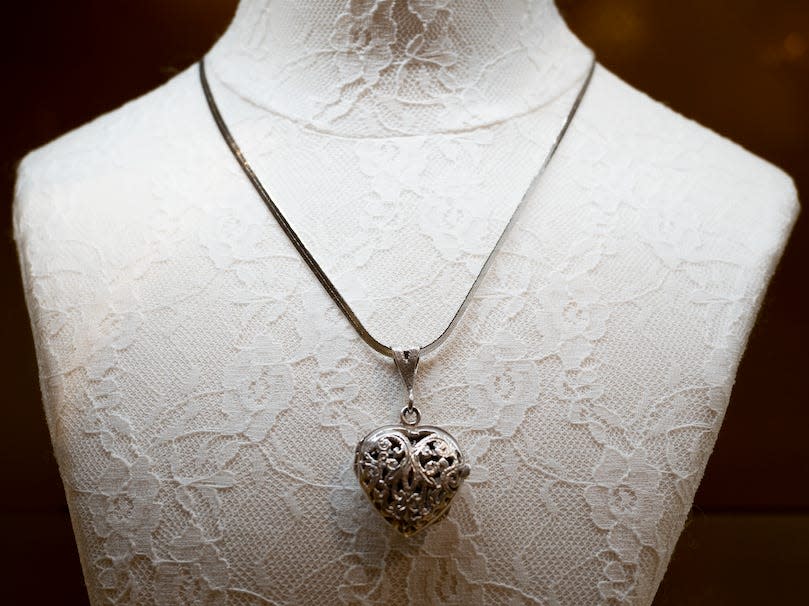

Diana gave each of her five bridesmaids a silver locket as a memento of her wedding.
Corelli said the necklace was acquired for the exhibition from Gaselee, one of the five female attendants who wore it for 16 years.
“It’s a really exceptional piece because it’s a personal gift that was presented to Sarah-Jane as a thank-you for being a bridesmaid,” Corelli said.
He added the royal also wrote a thank-you note to Gaselee, signed, “Love Diana.” He said the bridesmaid kept part of it folded up inside the heart-shaped locket.
One of Diana’s bridesmaids preserved the posy she carried at the royal wedding.


Gaselee solemnly carried this small bouquet when she walked behind the then-Lady Diana Spencer as she made her way up the aisle of St. Paul’s Cathedral on July 29, 1981.
Corelli said the posy was acquired directly from Gaselee, who had the flowers dried and placed in a frame. “It was a very important keepsake from the wedding,” Gaselee said.
He said the bridesmaids’ bouquets — which the younger girls carried in a white basket — matched Diana’s cascade of blooms.
The flowers in the bouquets and posies included orchids, lily of the valley, and white gardenias, The Mirror reported.
Diana wrote a heartfelt letter to a man who was struggling with bulimia. She used to battle with the same eating disorder.


The eating disorder that Diana suffered from in her 20s and early 30s was once a closely guarded secret.
She publicly spoke about her bulimia during her life-altering BBC interview with the journalist Martin Bashir. She said she was “ashamed” of the condition and that people thought she was “wasting food.”
Corelli said Diana’s admission helped break the stigma of having an eating disorder. He added that the princess often received mail from others with the disorder who were grateful that she’d brought the issue out into the open.
One of her correspondents, David Saunders, received a personal reply from Diana in January 1996 after he wrote to her about his own struggles with bulimia. His letter is now on display at the exhibition in Las Vegas.
“It is not easy for a gentleman to be open and honest about bulimia,” the princess wrote to Saunders.
She offered more encouragement with the words, “Remember, if I am able to conquer bulimia you can, too.”
The exhibition in Las Vegas includes a flamenco-style gown that Diana once wore on a tour of Spain.
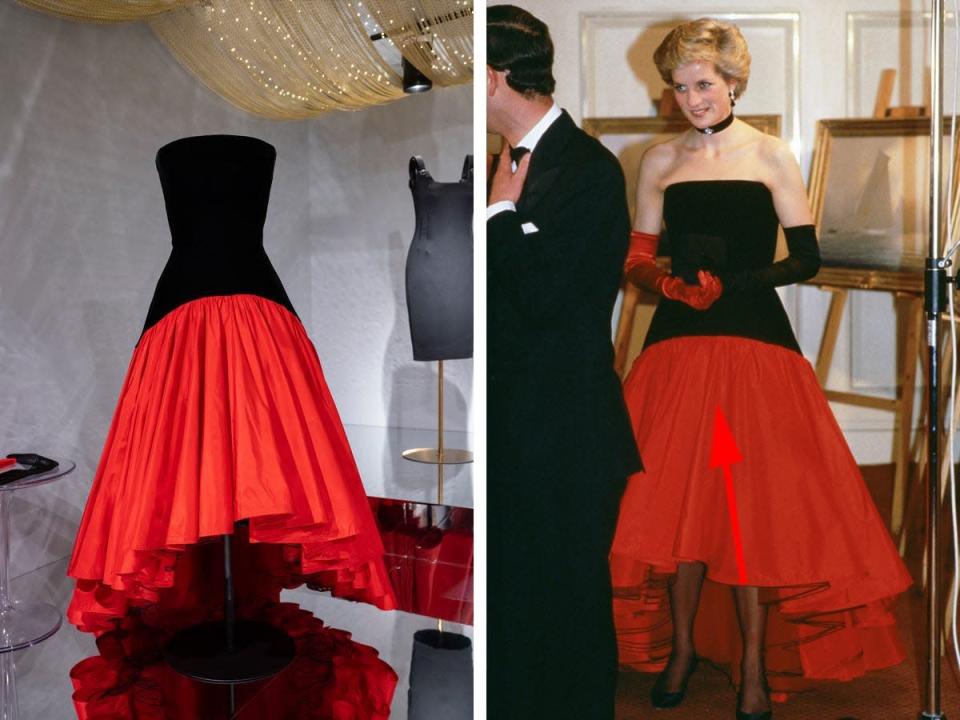

Diana’s red and black dress — which Corelli described as “flamenco-inspired” — is one of the most eye-catching gowns in the exhibition, Corelli said.
The curator said it was made by the British fashion designer Murray Arbeid, who created a variety of formal gowns for the princess.
Diana first stepped out in the dress in 1986 at America’s Cup Ball at the Grosvenor House hotel in London.
She wore it again the following year during a tour of Spain with Charles.
“It was fitting that she wore the dress in Spain,” Corelli said.
The exhibition also features a pair of long gloves — one black and one red — that Diana sometimes wore as an accessory.
“The gloves made the outfit look even more striking,” Corelli said.
The exhibition features some of the schoolwork that was completed by Diana in the mid-’70s.


Corelli said some of the most unusual artifacts in the exhibition were the workbooks maintained by Diana throughout her education in the UK.
One of the most interesting books consists of 78 neatly written pages in French. They also include a short essay about visiting a restaurant.
“We have books from her early childhood in elementary school to her senior years,” Corelli said. He noted that some of her writings were marked by her teacher in red pen to highlight the mistakes she’d made.
Most were composed in the early ’70s during her time at West Heath Girls’ School in the English county of Kent.
Corelli said some of the books came from servants who were once employed at Diana’s childhood home, Park House. It was on the royal estate of Sandringham in the county of Norfolk, where Diana grew up as a neighbor of the Windsor family.
This strapless showstopper was created by Catherine Walker, one of Diana’s favorite designers.


Diana was famously photographed dancing in this pink and blue dress with her then-husband, Charles.
“The train was twirling in the air,” Corelli said of the royal’s appearance at a ball in Australia in 1983.
Charles and Diana were on a four-week tour of the continent with their son Prince William, who was less than 2 years old at the time.
Corelli said Diana wore the dress at least two more times. She was photographed wearing the gown at movie premieres in ’89 and ’91.
The curator said the gown was created by Walker, one of Diana’s favorite designers. The collaboration between the two women started a few months after Diana married into the royal family in 1981. It ended 16 years later when the princess died in 1997.
Read the original article on Insider

